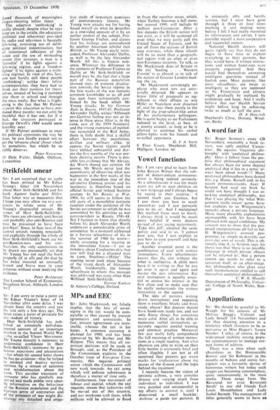Vowel functions
Sir: I am very glad to learn from John Rowan Wilson that the sub- ject of doctor-patient communic- ation is being tackled seriously. As a schoolmaster it was for many years my job to start children on a new language and I always began by saying to their surprise: 'I cannot teach you German, but I can show you how to teach yourselves and I can persuade you to do so'. And I maintained this method from start to finish. I always think it would be much more helpful if more doctors instead of just saying myteriously, 'Take this pill', adopted the same policy and said to us, 'I cannot cure you, but I can explain to you how to cure yourself and help you to do it.'
Another essential point is the combination of oral with written instructions. Every schoolmaster knows that the one without the other is ineffective. A child must have it in writing so that he can go over it again and again and master the new information. But oral instruction is equally essen- tial to arouse his interest in the first place and to make sure that he really understands the written instruction in the second.
The idea of patients writing down instructions and repeating them is excellent; blocks and biros ready, please! But doctors should have hand-outs ready too, and not only flimsy things but something more solid. After all, to be able to memorise verbal instructions ac- curately requires careful training and constant practice. Moreover few can really fully comprehend the full meaning of written instruc- tions at a single reading. And what chemists are able to write on their
little bottles is extremely brief and often illegible. I am not at all
surprised that patients got worst marks for 'explanation about the causes of the disease and the logic behind the treatment.'
I recently became the victim of intrinsic asthma, a very complex disease and varying much from individual to individual. I was very puzzled and unsuccessful in my efforts to control it, until I discovered a small booklet : Asthma: a guide for patients. It is extremely ably and lucidly written, but I must have one through it three or four times marking it and making notes before I felt I had really mastered its information and advice. I now consider myself a most cooperative and successful patient.
National Health doctors will quite rightly say that they do not begin to have time to explain everything to their patients, but they would have, if written instruc- tions and written hand-outs were properly organised. And they would find themselves answering intelligent questions instead of foolish ones. Most patients, like most schoolboys, are twice as intelligent as they are supposed to be. Frustration and anxiety might gradually be replaced by confidence and hope. And I really believe that our Health Service might before long be achieving twice as much at half the cost.
H. A. Haworth Shepherd's Close, Dorney, Wind- sor, Berks






































 Previous page
Previous page